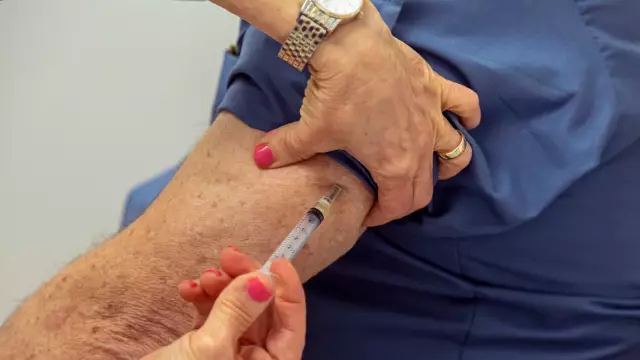- Author Curtis Blomfield blomfield@medicinehelpful.com.
- Public 2023-12-16 20:44.
- Last modified 2025-01-23 17:01.
Vaccination has been heating up lately. The media describes terrible complications after such a medical procedure, including even death. I must say that humanity has not yet come up with anything that could protect it from serious illnesses. In rare cases, terrible consequences occurred during the procedure. Such situations make parents think about the need for vaccinations for infants. Nevertheless, it is very difficult for the unvaccinated to be placed in a kindergarten, so the majority of parents take the procedure for granted. And yet there are those who write the refusal of vaccination.

The law in this case is on the side of the parents. Of course, a child may not be taken to kindergarten, but this is still not as bad as a threat to he alth. However, it is worth looking at this issue from the other side. For example, if a child has not been vaccinated against measles, he may well become infected with this serious disease. The virus persists indoors for two hours. Unvaccinated children almost all get measles.
Symptoms

An infected child has a fever, a cough,lacrimation, runny nose, conjunctivitis. All these signs are also with acute respiratory infections, but after 2-3 days a rash appears on the face, head, behind the ears. This is a serious disease with complications. When deciding to write a refusal of vaccination, you need to know everything about it.
Children are immune after birth. If the mother had previously had measles or was vaccinated against this disease, the child will not get sick for six months. Measles is a fairly serious disease with complications such as hearing and vision loss, otitis media, pneumonia, and even mental retardation. This disease also has a high mortality rate. Therefore, failure to vaccinate can lead to death.
Course of disease

The latent period of infection is 9-11 days. Even at this stage, the first symptoms of measles may appear. In the initial, non-specific period, whitish spots appear on the mucous membrane of the cheeks, hard and soft palate, conjunctivitis. The cough and runny nose also increase, the temperature rises. A rash occurs on different parts of the body in a strict sequence. First, it covers the face, neck, torso, thighs, arms, feet, legs. Irregularly shaped spots are concentrated most of all on the face, neck and chest. Currently, there is a decrease in the incidence of measles. Denial of vaccination, if it becomes widespread, may change the situation for the worse.
Vaccination
Vaccination against measles is given to children who have reached the age of 12-15 months. The second vaccination is given at 6 years of age. Immunity is maintained for 25 years. Sometimes the following reactions are observed after vaccination:
- high temperature;
- conjunctivitis, runny nose, cough;
- pale pink rash.
All these phenomena disappear after 3 days. However, there are complications that lead to allergic reactions, damage to the nervous system, and convulsions. Occasionally, thrombocytopenia also occurs. If an open ampoule is contaminated with Staphylococcus aureus, toxic shock syndrome may occur, which can be fatal.
Conclusion
Complications that occur after vaccination sometimes scare people. After weighing all the pros and cons, after listening to the opinion of doctors, parents decide whether to vaccinate or refuse it. Formally, the law is on the side of the parents, but in real life, without vaccination, a small child is not taken to a children's institution. And this is quite acceptable, as it can lead to mass quarantine.






